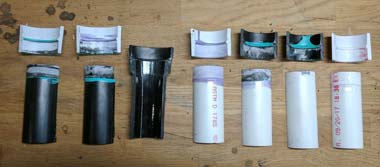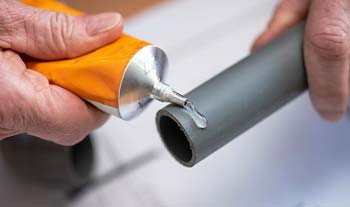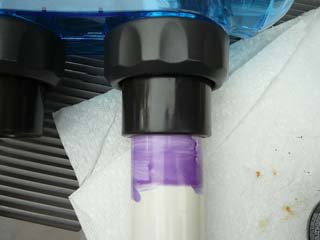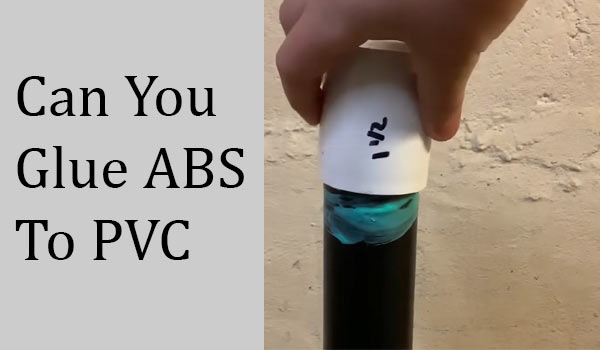Can You Glue ABS To PVC? Do It Yourself Now!!!
The two kinds of plastic - ABS and PVC are extremely popular choices in plumbing for an abundance of reasons. They both provide different systems with protection against most alkalis, acids and salts.
Even though they slightly differ in durability, price point, ease of installation and several other factors, homeowners may often consider gluing ABS to PVC.
However, is it really worth it? Can you glue ABS to PVC? Let’s figure out all the answers while also learning the basics of these two materials.
Table of Contents
What Are ABS And PVC?

ABS (Acrylonitrile Butadiene Styrene): ABS is a type of plastic used in many products including pipes, vinyl flooring, toys, car parts, and even clothing. However, this material is not without its downsides. As a result of its production, it contains toxic chemicals like dioxin that have been linked to cancer. In addition, it is nonrenewable and requires a lot of energy to produce.
PVC (Polyvinyl Chloride): PVC is another popular plastic that is commonly used in plumbing fixtures, appliances, and toys. While it is considered to be a safer alternative to ABS, it still poses some risks to our health. For example, it can leach harmful chemicals into water over time.
They both are the two most common materials prevalent in the pipes used for draining and venting purposes in residential construction. ABS only comes in black while the other is usually white. PVC pipes are more flexible but ABS offers higher strength and shock resistance.
Both require a special cement to construct connections but PVC needs a primer in addition to it. They also need different tools and techniques. If you're planning on doing any work with PVC, you'll want to invest in a PVC cutter. For ABS, you'll want to get a pair of pliers and a hammer.
That is why, professionals like plumbers typically work with only one of them to keep the connections simple and cohesive.
Can You Glue PVC to ABS?

When someone talks about “gluing” ABS to PVC, they are actually talking about the solvent cement which is created for joining different systems. Plumbers tend to use the solvent cement meant for the respective material while joining either ABS to ABS or PVC to PVC.
However, some handy homeowners choose to join one material to the other, even though establishing such connections is not the norm. And if you really want to do it, going for the solvent or glue may not provide the best results. Although, one way to ensure a higher quality would be to use the right purple primer before applying the glue.
Even though it is possible to glue ABS to PVC and create a failsafe connection, it is not the recommended way to join them. Let’s take a look at the much better alternatives instead.
Guidelines For Joining ABS And PVC

Make sure that both the surfaces used to connect the pipes have been cleaned well. There should be no remnants of dirt, moisture, oil or any other foreign material on them.
When using ABS or PVC piping, there are some things to keep in mind. First off, if you're not sure what type of pipe you need, you should always call a professional plumber. Second, if you're going to be installing pipes, you'll want to use a proper tool. Third, you'll want to make sure that you have enough space around the pipe before you start working. Finally, you'll want to avoid cutting into the pipe itself.
What Not To Do When Joining ABS To PVC?
A common mistake is to join ABS to PVC with a green cement whose package claims it was created for that particular connection. Even when such an easily accessible solvent cement carries an IAPMO approval stamp, they are actually meant to connect a complete ABS system to another system made of PVC.
Better Alternatives For Joining ABS And PVC

Mechanical Coupling
The best way to join ABS and PVC is mechanical coupling. To do this, you will need the right adapter or fitting, which needs to be approved or listed by your area’s plumbing code for this kind of transition. An appropriate adapter would have a stainless steel band in the middle to boost rigidity.
The next step is to use an open joint between the two sections – something that allows water to pass through easily but can also be sealed with a plastic pipe-fitting sealant if needed. The advantage of using an open joint is it creates a more continuous flow path, making the system less likely to develop pressure imbalances like air traps that could cause flooding issues (especially when draining into a sump pit).
If you decide to replace your entire kitchen faucet yourself, know that even though most of the parts are not overly complicated, they do require patience to put together and install correctly.
Which One Is Better: ABS Or PVC?
Both ABS and PVC pipes are typically used to build systems for sewer, ventilation, drains and waste management. Since gluing them may not be a good idea, you may consider settling on a single material for your next plumbing. Here are some factors that can help you make an informed decision.
Benefits And Drawbacks Of ABS Piping
Pipes made of ABS are used as a cost-effective option in both residential and commercial constructions. They are easier to install than PVC pipes, but also come with lower durability. These pipes are prone to deformation, especially if they are left exposed to the sun. So installing them above the ground is not recommended.
A major advantage of ABS is that it is free from the harmful component called Bisphenol A or BPA. Purchasing BPA-free parts ensure you and your loved ones higher security from health hazards.
Benefits And Drawbacks Of PVC Piping
Compared to ABS, PVC is stronger and more durable due to its corrosion resistance properties. This makes it a fitting choice for industrial settings where fumes and gases are usual occurrences. You can also improve its flexibility by adding plasticizers to the original material.
Its sturdy structure makes the installation process much easier. You will have the freedom to use PVC piping for walls, floors or ceilings. However, its weight is double of material ductwork which can complicate the process in certain cases.
Even though its insulation properties help to maintain an efficient heating and cooling system in larger buildings, there is a limit to its temperature tolerance. PVC cannot handle heat beyond 140°F which can restrict its applications. Besides, these pipes are generally more expensive than ABS.
Frequently Asked Questions
Does Epoxy Glue Work On ABS Plastic?
Epoxy resin adhesive is the best suited for repairing ABS plastic. This glue made of two components works through the chemical reaction between resin and a hardener. The resulting bond becomes so strong that it can work on materials like wood and metal. So it is used to bond large areas of relatively lower weight.
How Long Should PVC Pipe Last?
Typically, PVC pipes last about 25 to 40 years. However, with the help of enhancements and technological advancements, this lifespan can be extended to 70 years or even longer.
Even though they are not as durable as metal piping, homeowners choose PVC for their anti-corrosion properties and the safety of drinking water.
Is ABS Pipe Safe For Potable Water?
While there are a few potable varieties of ABS, professionals do not recommend using it for any system except draining to the sewer. That is because it might have chemicals fighting against algae, which in turn can leach into the tank.
Conclusion
So, can you glue ABS to PVC? Sure, but glue should be the last resort for attaching ABS to PVC pipes. Solvent cement is a much smarter option since it can deliver more durable and reliable results.
However, the best solution would be to go for mechanical decoupling, as recommended by home inspectors and professional plumbers.
If possible, try to build a cohesive structure with only one of the materials. The good news is that both plastics can be recycled. If you don't know what to do with them, you can always call your local recycling center or contact your state's Department of Environmental Quality.
Also read:

